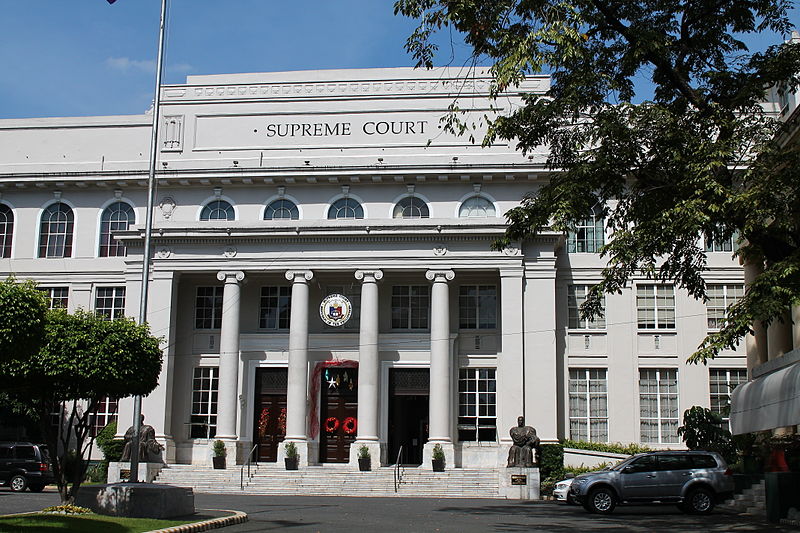News
SC affirms withholding tax on gov’t workers’ bonuses, fringe benefits

“All income received by an employee from his/her employer are presumptively taxable and subject to withholding,” the SC said. (Photo By Aerous – Own work, CC BY-SA 3.0)
MANILA — The Supreme Court (SC) affirmed the regulations issued by the Bureau of Internal Revenue (BIR) stating that fringe and small value benefits received by government workers are subject to withholding tax.
In a media briefer released by the SC Public Information Office on Wednesday, the High Court junked the petition filed last 2014 by government workers, led by the Confederation for Unity, Recognition and Advancement of Government Employees (Courage), and several associations of Regional Trial Court judges both in Manila and Iloilo City that challenged the validity of Revenue Memorandum Order (RMO) 23-2014, the policy of taxing income allowances, bonuses, and compensation for services granted, which they claimed as non-taxable fringe and minimal benefits.
The High Court affirmed the validity of Sections 3, 4 and 7 of Revenue Memorandum Order 23-2014 issued by the BIR which classified as taxable compensation income allowances, bonuses, compensation for services granted to government employees and other benefits that have been enjoyed by government employees for some time now without any tax deductions, except for the 13th month pay, in excess of PHP30, 000 and the loyalty pay.
Under RMO No. 23 – 2014, which took effect on July 7, 2014, all benefits received by employees and officers of government will be subject to 30-32 percent tax.
“All income received by an employee from his/her employer are presumptively taxable and subject to withholding,” the SC said.
The High Court added that “the Government as an employer has the duty to withhold and remit proper taxes due thereon.”
The High Court ruled that (a) all income received by an employee from his/her employer are presumptively taxable and subject to withholding tax; (b) government, as an employer, has the duty to withhold and remit the proper taxes due; and (c) an employee who claims exemption from withholding taxes has the burden to prove the factual and legal bases of the claim before proper administrative and judicial proceedings.
The Court, however declared null and void Section 6 of RMO 23-2014 which compels local government officials such as governors, city and municipals, barangay captains, and heads of office in government agencies and government-owned or controlled corporations to withhold and remit withholding taxes.
It agreed with the arguments of the petitioners led by the Courage that Section VI violated the principles of decentralization and local autonomy set forth under Republic Act 7160 or the Local Government Code of 1991 as it obliges local government officials to withhold the questioned taxes, and if they fail to do so, they may be fined or imprisoned pursuant to the said provision.
“In imposing upon these officials an obligation not found in law or in implementing rules, the Commissioner of Internal Revenue (CIR) did not merely issue an interpretative rule designed to provide guidelines for enforcement of the law but supplanted details — a power vested by law only on the Secretary of Finance,” the SC said.
“For this reason, the CIR acted in grave abuse of discretion in issuing Section 6 of RMO 23-2014,” it added.
Meanwhile, in upholding the validity of Sections 3 and 4, the Court explained that contrary to the claim of the petitioners, there is no additional tax imposed as the sections merely mirror the relevant provisions of the National Internal Revenue Code of 1997 on withholding tax on compensation income.
The Court stressed that despite the fiscal autonomy being enjoyed by the judiciary, Ombudsman and Constitutional Commission, this does not give them immunity or exemption from paying taxes imposed under the tax code.
According to the petitioners, the new tax measure is unconstitutional as it usurps the power and authority of the legislature in defining new offenses and prescribing penalties, particularly on LGUs.
The petitioners said then BIR Commissioner Kim Jacinto-Henares “over-stretched” her exercise of power in coming up with the said revenue without the approval of her immediate superior, the DOF Secretary.
Furthermore, the petitioners said the subject RMO would affect their socio-economic plight especially in light of the rising prices of basic commodities.
Likewise, they argued that the imposition of taxes on fringe benefits is specifically barred under the Tax Reform Act of 1997 and the Labor Code promulgated in 1974.





















